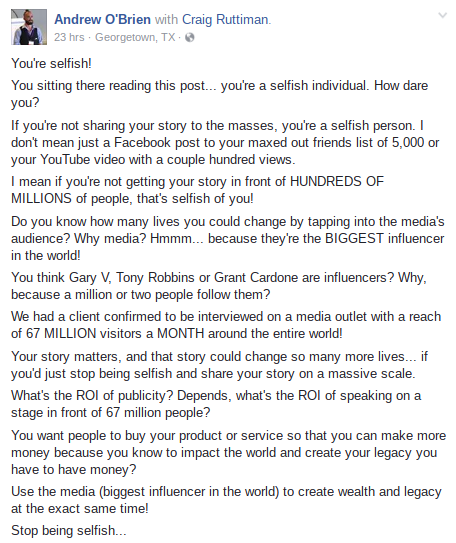
The term “brand” is thrown around a lot these days, generally in reference to a company. But personal branding is just as, if not more, important than company branding, especially for early stage entrepreneurs.
Here’s why you need a personal brand and how to achieve it.
First, let’s define “Personal brand”
Your personal brand is, essentially, how you market yourself to the world on and offline.
This can be done in multiple mediums, including on social media, in blog posts and articles, at speaking events and when you’re interacting with your community. It’s how you want to be seen in the world.
It works best when you talk about your most embarrassing failures.
The temptation is to present yourself as perfect. But your personal brand has to be based on reality. Your authenticity is also what will drive people to trust you. That means admitting when you’ve failed or made a mistake and letting people know you’re taking steps to learn how to do better. It also means seeking advice from mentors and influencers who already have a personal brand.
It also will gain the most interest if you speak about what people are most interested in.
So think of your personal brand in terms of Google Keyword Planner. Lots of things in your life are interesting, but depending on how you portray yourself, not all your personal and professional activities will correlate. For example, I’m secretly obsessed with virtual assistants and helping other entrepreneurs hire them. But, my brand, Matt “Handshakin” Holmes, is all about networking and personal branding, so I generally don’t publish a ton of content about virtual assitants, especially on the home page of Handshakin.com or my personal website mattholmes.io.
You are your company
As an entrepreneur, you are your company. And not just in the work-around-the-clock-to-make-the-company-run sort of way. Your investors, customers and employees largely want to work with your company because they want to work with you.
Your personal brand carries your company, at least during its infancy. Your investors, clients and employees need to be able to trust that your company is worth their time. And they’ll only do that if they believe they can trust you.
Just be careful of how this effects your time as your company grows. If your goal is to hire 100s of employees, but the company has your last name in it. Be prepared to combat the problem of angry customers calling to ‘talk to the boss.’
How to establish your personal brand
You want to be seen as trustworthy and as a reputable expert in your field or industry. People need to know that you have what it takes to be successful, and they’re going to look you up online before they even consider doing business with you. When they do that, you need to have value to offer them online. You see a lot of people using e-books, but I’ve had so many freaking e-books offered to me I’m way more likely to download a checklist in exchange for my email nowadays. You’ll see big sites like Hubspot and others arguing that 1 page checklists are performing better today.
This means you need to get ahead of the game. Establishing an authentic online presence is an important step toward personal branding. Your online social media accounts should all tie into your branding message, and point back to your personal website.
A blog, personal website and/or guest spot as a columnist on an industry website are great ways to establish yourself as an expert while offering helpful advice to those who need it. But, it’s really best to ‘own your own real estate’ online and be promoting a website (domain) that you own, not your facebook fan page, because that is their online asset, not yours.
Did I mention to choose your expertise wisely?
You’re probably really good at a lot of things. But your personal brand needs to be focused. Take some time to research other industry experts and see if you can find an opening somewhere, a need that you can fill. What type of expert do you want to be known as? What can you add to the already ongoing discussion in your industry? Where can you fill a void?
This will take some time, and it isn’t a decision to be made hastily. Think about who your target audience is and what you can offer them. Your niche audience will be small, but a narrow focus can have a major impact when it comes to building your personal brand and expanding your business.
Always be networking
There’s no getting around networking when it comes to building your personal brand. Network online, network offline, network anywhere you go.
Network with the intent to build your personal brand. You’re going to have to talk about yourself and your expertise. If that feels uncomfortable, well, you’re going to have to get used to it. In fact, I saw an amazing facebook post about NOT BEING SELFISH. Check this out, it’s hilarious and also very true!

Make sure you don’t spend all your time talking about yourself, though. Learning about the expertise of other influencers can help you build your brand. It also can help you forge deeper connections, particularly if you attend networking events for professionals in your industry. And, of course, it’s just plain polite.
Personal branding has become important specifically because people want to connect with, well, people, not companies. Your expertise should be something that a niche audience will find useful, and your networking opportunities will allow you to connect one-on-one with members of your target audience. If you’re ready to take a stab at personal branding but aren’t sure where to start, contact us today!
Originally posted at www.handshakin.com.



